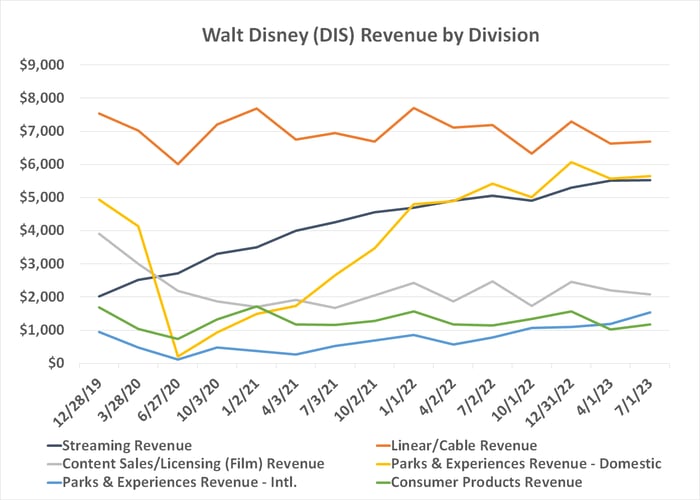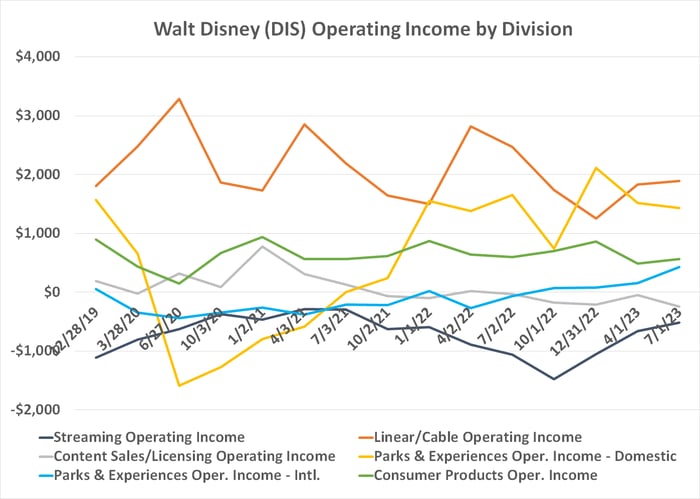My first take away from this article was that this was a summer Flop for ALL theme parks but so many on Disboards insisted it was a Disney only problem...
9:00a ET 9/23/2023 - Dow Jones
Theme Parks Pin Hopes on a Fall Rebound After Summer Flop -- WSJ
Mentioned: DIS FUN SEAS
By Will Feuer
Theme-park operators are pinning their hopes on a blockbuster fall season, betting that splashy Halloween and Oktoberfest events can make up for a summer season hurt by extreme weather.
Dorney Park-owner Cedar Fair, Six Flags Entertainment and SeaWorld Entertainment are looking to lure customers this fall by tapping into growing demand for Halloween festivities. Other parks, including Disney, rolled out themed events earlier than ever this year. In coming weeks, haunted houses and fleets of ghoulish actors will take over theme parks across the country.
The Halloween season and weeks leading up to it will prove critical, after a cold, wet spring and scorching summer heat waves dashed hopes for a booming year. Attendance across the three major regional park chains is still below prepandemic levels, even as other travel sectors have fully recovered.
"I have seen through the years where Halloween has made or broken a season," said Dennis Speigel, a longtime theme-park consultant. This year, Speigel said, some parks began teasing Halloween events as early as June. "They knew they needed to start thinking ahead and hanging their hat on Halloween."
Shares of regional theme-park operators are lagging behind the S&P 500 this year, as hopes for a robust postpandemic recovery meet the reality of heightened competition for leisure spending and uncooperative weather. Analysts say park traffic improved later in the summer, but the fall season remains pivotal.
Theme parks' embrace of Halloween has been a multidecade trend. In 1973, Knott's Berry Farm in Buena Park, Calif., now owned by Cedar Fair, introduced "Knott's Scary Farm" to drum up more fall business. Now, most U.S. amusement parks, and even some in other countries, mark the holiday with their own festivities. Earlier this year, Universal said it plans to open a year-round horror-focused park in Las Vegas, a sign of ambitions to offer scare-centric events beyond Halloween.
The expected fall bump comes with challenges. Kids are back in school and their fall schedules become packed. Apple picking, leaf peeping and other fall activities also compete for families' leisure time. Hurricane season threatens to disrupt the period, especially in Florida and Texas. In late summer, Hurricane Idalia battered Florida and other parts of the Southeast, while tropical storm Hilary posed a rare threat to Southern California as it approached land.
Still, fall events have become moneymakers. Across Six Flags, SeaWorld and Cedar Fair, the fourth quarter, which runs from the start of October through the end of the year, has become a bigger source of annual revenue over the past decade. In 2019, Cedar Fair generated more than 17% of its annual sales in the fourth quarter, up from 12% in 2013.
Beyond driving traffic, many parks cash-in by selling separate tickets for day- and nighttime Halloween events. Many of the evening events have also become more adult-oriented, said Chris Woronka, an analyst at Deutsche Bank. That translates into a boost of high-margin cocktail and beer sales.
"Let's face it, this is like an adult-beverage themed holiday," Woronka said. "Adults will spend more per capita than they will just on their kids."
Hersheypark launched its haunt-focused event, called "Dark Nights," in 2022. The event, which started earlier this month, includes a haunted coal-mine attraction and various so-called scare zones. The event also features a haunted house based on a character called Ethel Mortem, a second-generation meat processor running the family business with the help of her sinister nieces and nephews.
SeaWorld runs a not-so-spooky daytime event called "Spooktacular," which turns into "Howl-o-Scream" at night. "Howl-o-Scream is deliberately NOT for young children or the faint of heart," a spokesperson said. The nighttime event features live shows and haunted houses, along with food and drinks available at the "Blood Bar."
Six Flags gave customers in the spring an early taste of its popular "Fright Fest" event, with its first-ever "Scream Break." The chain's bigger parks are rolling out new haunted houses this fall based on popular horror movies like "The Conjuring" and "Saw." The child-friendly "Boo Fest" features corn mazes and trick-or-treating. "These events play a vital role in the company's strategy," Six Flags said.
Parks also seize on the festivities to get a jump on selling next-year season passes. Six Flags recently marketed discounts of up to 70% on 2024 season passes, which also include admission to Fright Fest and its Oktoberfest parties. At the chain's park in Arlington, Texas, the highest-grade 2024 season pass was on sale for $110 a person, down from $170.
"The companies have just been incredibly aggressive with their sale passes for the next year," Deutsche Bank's Woronka said. "It's not just about what they're going to spend for Oktoberfest or Halloween. It's really, 'Can we also get the pass?'."
Natalie Parrish, a 35-year-old chemist from Greenwood, S.C., typically skips Halloween festivities at the Carowinds park in Charlotte, N.C. A recent visit to the park with her daughters, ages 10 and 16, convinced them to plan a return trip for October, after they saw decorations for the "SCarowinds" event going up. Admission is included with the roughly $300 they spent on season passes for next year.
"It looks like it's going to be really fun," Parrish said. "And wherever their little run-through scary sections are -- that looked pretty cool too."
Wall Street analysts will be watching closely to see if season-pass deals tempt potential parkgoers, as costs ranging from higher interest rates to the resumption of student-loan payments squeeze consumers. A bright spot for theme parks this year is that consumers have continued paying higher prices for admittance, parking, food and more.
Financial challenges are weighing on consumers' willingness to spend. According to a recent survey from the National Retail Federation, about three of every four consumers said their Halloween shopping will be affected by economic challenges. Still, Americans are expected to spend $12.2 billion on Halloween celebrations, up 15% from last year, according to a separate survey from the trade group.
Theme-park executives blamed weak attendance in the first half of the summer on extreme weather. Cedar Fair Chief Executive Richard Zimmerman said last month that while more-volatile spring and summer weather has weighed on the traditional season, warmer fall weather has boosted business in parts of the country.
"The back half of the year is where we've actually benefited from the weather driving the demand," he told analysts on a conference call. "It has created opportunity."
Soft attendance this spring and summer, though, might have also been an early warning that consumers are pulling back, B. Riley analyst Eric Wold said. Season-pass sales this fall and next spring should deliver some clarity.
"In terms of willingness to plunk down a committed dollar amount for the next year, when you may be worried about buying groceries, that's probably a better tell on consumer health," Wold said.
Write to Will Feuer at
Will.Feuer@wsj.com
(END) Dow Jones Newswires
September 23, 2023 09:00 ET (13:00 GMT)
Copyright (c) 2023 Dow Jones & Company, Inc.

